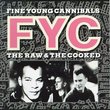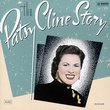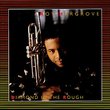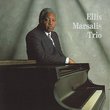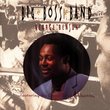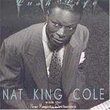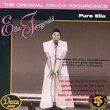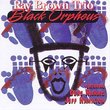| All Artists: Doc Cheatham Title: The 87 Years of Doc Cheatham (Legendary Pioneers of Jazz) Members Wishing: 0 Total Copies: 0 Label: Columbia / Sony Release Date: 6/22/1993 Genres: Jazz, Pop Styles: Swing Jazz, Dixieland Number of Discs: 1 SwapaCD Credits: 1 UPCs: 074645321523, 074645321547 |
Search - Doc Cheatham :: The 87 Years of Doc Cheatham (Legendary Pioneers of Jazz)
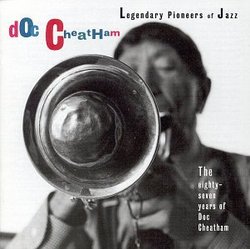 | Doc Cheatham The 87 Years of Doc Cheatham (Legendary Pioneers of Jazz) Genres: Jazz, Pop
|
Larger Image |
CD DetailsSimilarly Requested CDs
|
CD ReviewsMeet one of the most extraordinary trumpet players !!! JEAN-MARIE JUIF | BESANCON France | 04/15/2004 (5 out of 5 stars) "Yes,Doc Cheatham is my man.Just like Lester or Louis.Everything this guy could blow is a real treasure. And as the years were passing by,Doc's playing was more magnificent.It seems incredible for a trumpet player,but his playing has never been more beautiful than when he was over 90 years old !!! The years never affected his style and freshness;and this record,made when Adolphus Cheatham (born June 13,1905 in Nashville,Tenn ) was 87,is a real marvel.Dear Doc died five years later,and he remained active in music until his death.I'll remember him, first, as one one the most important and essential trumpet players in the history of jazz (he comes just after Armstrong,on the second place,with Roy Eldridge,Shorty Baker,Buck Clayton,Bill Coleman,and is followed by many and many others,Dizzy,Ladnier,Cootie Williams,Clark Terry,Clifford Brown,etc), and second, as a fantastic human beeing.I had the opportunity of meeting him once in Paris,France,during the late eighties;and I've been amazed by the incredible youth of this man,and by his incredible charm.Doc never thought he was a star;he never had dreams of fame and celebrity,he didn't care.He just spent 75 years of his life blowing beauty out of his trumpet. Doc's influences include of course Louis Armstrong (but EVERY jazz trumpet player was influenced by Satch,from Bill Coleman to Lester Bowie),but also Joe Smith (1905-1937),Bill Coleman (1904-1981) and even maybe Bix Beiderbecke (1903-1931).His phrasing has a kind of freshness and sensibility that have rarely been equalled by any other trumpet player ("I'll guess I'll get the papers and go home").His improbable singing is just the same. Many (in fact,not so many,but Doc never recorded a lot under his own name) many records by Doc are available on CD,and this one isn't better than "swinging in New Orleans",or "at the Vineyard",or his duet with Nicholas Payton (near 70 years younger than Doc when it was recorded!!!);magnificently backed by pianist Chuck Folds,bassist Bucky Calabrese and the great drummer,Jackie Williams,dear Doc blows very beautiful versions of Duke's "love you madly",Monk's "'round midnight",and standards like "New Orleans","have you met miss Jones";he also plays very rare tunes like "that's my home","sleep","my buddy" or "okay baby";and all of these tunes are gems.Of course,there are some records by Doc which have never been reissued on CD,like his absolutely magnificent "tribute to Billie Holiday",recorded with swedish musicians in 1987 for Kenneth Records.But CDs will offer you many hours of the very great music of this guy ("I double dare you" on the "Windsor concert).Doc wasn't just a very good trumpet player;he simply was one of greatest stylist on this instrument.And you can't miss him if you're a jazz lover." CLASSIC RENDITION OF ROUND MIDNIGHT Jay Fuchs | BOYNTON BEACH, FLORIDA United States | 08/27/2001 (5 out of 5 stars) "MANY FINE MUSICIANS HAVE RECORDED ROUND MIDNIGHT, BUT DOC CHEATHAM'S VERSION IS BY FAR THE BEST. FORGET HIS ADVANCED AGE, IT ONLY ADDS TO THE FEELING AND DEPTH OF THIS CLASSIC RECORDING. I CONSTANTLY REPLAY THIS TUNE AND DISCOVER NUANCES THAT I HAVEN'T HEARD BEFORE. THIS TUNE ALONE IS WORTH THE PRICE OF THE CD, IT IS AN ABSOLUTE TREASURE." Doc Cheatham Brian Gilmore | DC | 05/11/2007 (5 out of 5 stars) "The Last Stand of Adolphus "Doc" Cheatham
by Brian Gilmore Friday night. June 1, 1997. A frail old black man sat at a table in the dark just off the side of the stage at the legendary Blues Alley jazz club in the heart of Georgetown in Washington D.C. Right in the midst of smoke, laughter and the chatter of the crowd that sat in anticipation of another important night of "jass". Amongst the sipping of cold beer, whiskey, red wine, easy dining on chicken tenders, french fries, salmon, gumbo, catfish, he, this majestic old man, unassuming and dapper in an old dark blue suit, sat beside the tiny stage inside this tiny club and smiled. Poet Cornelius Eady, a lover of jazz himself, would have called the old man that night an "old bag of bones." It would have been appropriate though this man was full of life. He was ready too as he had been ready for decades. His trumpet was in the case at his feet and everyone who came up to him spoke politely and quietly. It was yet another jam session on the long lonesome trail of the jazz trumpeter. The ruler. The most dominant and the most important instrumentalist in the history of jazz. Minutes later as the old man sat still smiling just below the stage, New Orleans' based trumpeter, Nicholas Payton and his band blew into a elevating set of energetic jazz numbers from Payton's two knock?out albums. Payton's 1997 CD, "Nouveau Gumbo" is a modern take?off on music from New Orleans and will be talked about for years to come. This was where Payton would pull his tunes from this night. Payton, yet another fine trumpet player from the "Big Easy" in the tradition of those legendary cornet players, King Buddy Bolden, Freddie Keppard, Buddy Petit, Joe "King" Oliver, Lee Collins, Louis Armstrong and Henry "Red" Allen has not disappointed jazz lovers. He didn't disappoint the crowd at Blues Alley that sat and listened to the power and discipline of this "young lion" and his band working on all cylinders that night in June 1997. But like me, though the crowd came to hear Payton, the forecast of jazz; on this special night we came to devour the passion of jazz's yesteryears. All of it which sat at the edge of the stage inside the body of that old man who just smiled in his dark blue suit and his old bag of bones. With his trumpet case resting at his feet, Doc Cheatham, or should I say, Adolphus "Doc" Cheatham, was ready to play. I first laid eyes on Doc Cheatham when I watched a documentary on jazz years ago called "The Story of Jazz". During that program, Doc was captured sitting on a couch looking regal and elegant like an old relative passing down short tales of times long since past. I thought of my grandfather telling stories to me when I was a kid on his sun porch. Each time Doc spoke, his soft creaky voice brought up jazz's epic beauty. The richness, the placidness, the essential part of the American experience that became the world's first "world music" according to the late avant garde trumpeter Lester Bowie. Doc had all the answers in that film, all the best anecdotes, and knew everyone who was anyone in jazz throughout its history. He was a trumpet player and a singer and from that day forth I knew I wanted to hear him, see him, find out why he was so important and why everyone always brought up his name. So in the late Spring 1997, I traveled to the legendary JazzFest in New Orleans, Louisiana to absorb the festival of festivals in the city that seems to be always in the midst of some ritual. I knew that Doc Cheatham and Nicolas Payton were set to play a set during the festival and I made a point to try to catch their show. There were so many celebrated and emerging jazz players in New Orleans that week (McCoy Tyner, James Moody, Herbie Hancock, Fred Foss, Terrence Blanchard, etc.), I got the schedule mixed up so I missed Doc. I was heartbroken. But then a month later I saw that Cheatham and Payton were coming to Blues Alley in Washington, D.C. for one of those Blues Alley weekends full of solos and cold beer and catfish. I knew I was going to be there. No mix?ups this time. I would know his sound. Adolphus "Doc" Cheatham was born in 1905 in Nashville, Tennessee and was one of the last remaining links to jazz's initial explosion into the world out of New Orleans up the Mississippi River to Chicago. Doc was right there learning how to blow as King Oliver first took over the world with his cornet only to give it away to a young ambitious cornet genius named Louis Armstrong who he invited to play in his band in the Windy City. This is where Doc takes you. One story has Doc sitting in for Louis Armstrong one night in Chi-town. That must have been a chore. Well, Doc surely isn't Louis Armstrong (who is for God sakes), but he is, well, Doc; if he did sit in, I know he probably did the music well. So nearly 92 years after he climbed into this world in Nashville, after countless gigs, one night stands, bad cafes, unfriendly crowds, recording sessions, rides on buses and trains to strange packed sweaty lounges all over the world, swing bands, latin troupes, his own quartet, trumpeter?singer Adolphus "Doc" Cheatham climbed onto the last earthly stage he would ever grace in Georgetown, Washington, D.C., in a little smoky jazz joint in an alley, sit in the last chair he would ever sit in, and enjoyed the last weekend stand of his earthly visit with a young up?and?coming band of musicians who would soon be mesmerized by what the old man could do with his voice and his heart. For 25 minutes, he led the Nicholas Payton Band and the crowd at Blues Alley that night through a poignant set of essential classic jazz tunes. Doc both sang and soloed and not for a minute did it all seem as if he was 91 and holding on like a prizefighter who had stayed too long in the ring. Doc was up to the task. A soloist at 91, imagine, and a fine one at that. Sitting in a chair and never wavering as his notes blessed the smoke of Blues Alley and seemed to take us all back and remind us why jazz was so beautiful and "black and blue". Doc was superb right through yet another timeless version of "Struttin' Some Barbeque", then Crescent City clarinet legend, Jimmy Noone's "Sweet Lorraine" followed by the beautiful and breathtaking, "Do You Believe In Love At Sight" from his album with Payton that had the crowd at Blues Alley gasping for air at how pure Doc played trumpet and sang. How could this old man who could not even walk onto the stage without a cane and some assistance play like this? Sing like this. Never miss a beat. Never out of tune. Doc mixed the short set with references to his long and illustrious career in the center of jazz too. He talked about lost love, some of his jazz comrades from the early years, and the joys of continuing to play into his 90's. Doc, strong and sweet, from the beginning through the swing era, up to yet another re- birth as a brilliant soloist in his 90's, right until now where Doc's tone was clever and strong. Doc chose his notes carefully that night as always and made sure the notes stayed fresh with each breath. Midway through the set as it he was reciting history, Doc pulled out a slightly dented mute given to him by King Oliver. That is - Joe "King" Oliver. Joe Oliver's mute from New Orleans in the club. Doc played it like it was 1922 and King Joe was right at that moment whispering in Doc's ear telling him how to use it. One felt like they were truly learning what jazz was once and for all. Feel the moment. Do what you can sense in your soul right now. Create. Just like Bolden playing in some parade in New Orleans. Diz turning his horn up. Duke mixing the clarinet, trombone and trumpet a different way to create "Mood Indigo". That's what Doc was doing. Making a space again for King Oliver and the Creole Orchestra. Capture the moment, the feeling. Appropriately, Doc closed with a Eubie Blake tune as the young Nicholas Payton just stared at his mentor and smiled. Doc didn't say the name of the tune, he just said it was a tune by Eubie Blake. Blake, an extraordinary ragtime pianist from Baltimore, and of course, a key link in the jazz pantheon once jazz comes north to New York, was seemingly doing the whispering now. Taking over for King Oliver. Yet another lesson for us from Doc Cheatham: Don't forget about Eubie Blake. That Monday, after that weekend stand at Blues Alley, June 3, 1997, Doc had a stroke in his hotel room. He passed from this place at a hospital in the city of Washington D.C. His weekend stand at Blues Alley was his last. In my city, Doc Cheatham decided enough was enough. He was gone on to see the great trumpeter Gabriel now just before the beginning of end of his 92nd year on earth. I read about it in the local papers. That Friday, Doc had taken me back to the 1920's and jazz's beginnings and that Monday, Doc had gone on. He left jazz in good hands to young star trumpeters like Payton and Roy Hargrove and other New Orleans up and coming superstars like Leroy Jones. His music is now forever etched in my mind. His appreciation of the simplicity of jazz, yet his way of seizing the moment, of creating what you feel out of what's before you. Take in your heart all that you are and can offer and give it to the people in your own way. That's what Doc Cheatham did that night at Blues Alley during his last stand. All the way to the last note he ever played. Just one long song. " |

 Track Listings (14) - Disc #1
Track Listings (14) - Disc #1
